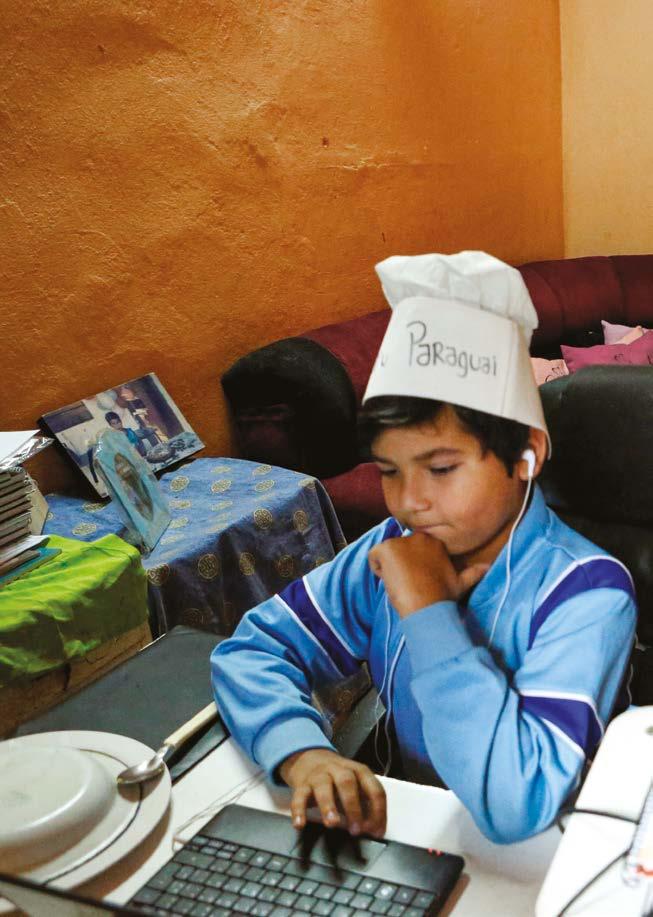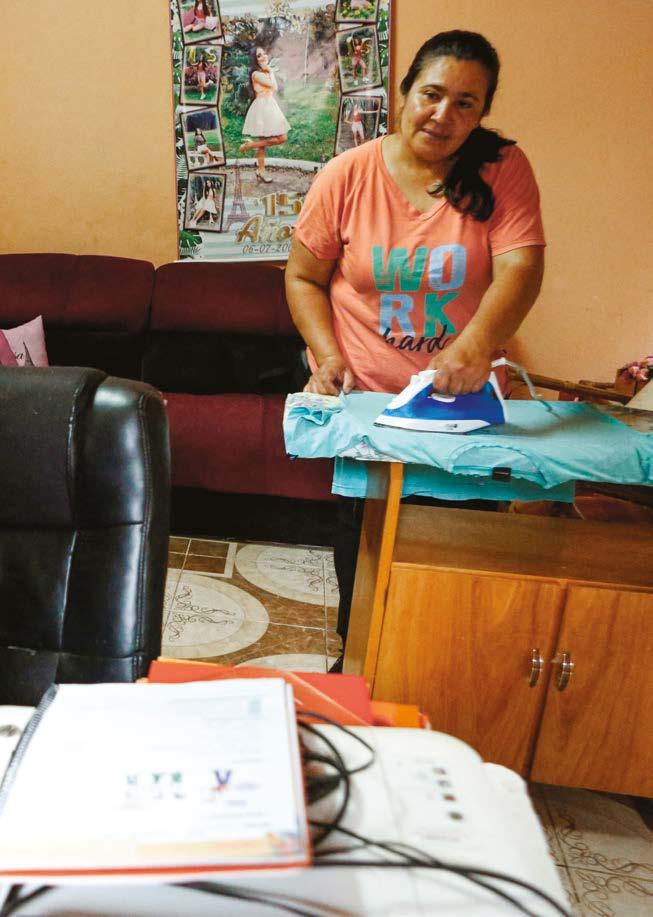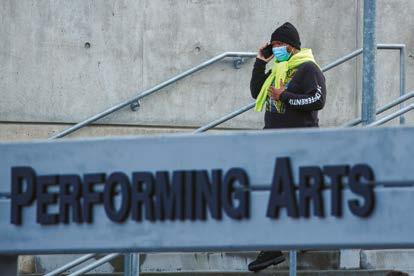
14 minute read
At the End of the Day, for Many People There’s Only School
At the End of the Day, for Many People There’s Only School
Distance learning has revealed and exacerbated the differences between those who can rely on economic and social support to gain access to education in any circumstances or any situation, and those who are excluded. It has proven that (unfortunately) money talks.
Advertisement
BY CLAUDIO GIUNTA — WRITER AND LECTURER IN ITALIAN LITERATURE
There was no single standard response to the COVID lockdowns and subsequent transition to remote teaching among students, for the simple reason that the students all had different circumstances – coming from families with varying levels of wealth, education and sensitivity to the value of education. Money matters; indeed, it is almost the only thing that matters.

Rosa Maidana, 45, irons clothes as her son Luis Maidana, 9, attends the virtual school for distance learning, as the coronavirus disease (COVID-19) restrictions continue, in San Antonio, Paraguay September 3, 2021. Latin America's mothers are lagging behind in the pandemic of economic recovery, returning to the labor force more slowly than men, in a trend that experts say could set back female labor force participation for a decade across the region.
REUTERS / CESAR OLMEDO
It is not unusual that apologists for the state of the world as it is tend to overlook this. One of the most influential essays on education of the 2010s was Amy Chua’s "Battle Hymn of the Tiger Mother", in which the author – a law professor at Yale – provided a how-to guide to raising academically successful, high-performing, competitive children. The recipe, summarised in the first page of the book, is as follows: “Here are some things my daughters, Sophia and Louisa, were never allowed to do: 1) attend a sleepover 2) have a playdate 3) be in a school play 4) watch TV or play computer games 5) get any grade less than an A 6) not be the #1 student in every subject except gym and drama.” This was in 2011. Sophia and Louisa have since grown up and, if the internet is to be believed, harvested the intended fruits of the disciplinarian education imparted by their mother. Throughout the book, however, their mother never once seems to consider that her educational model works not because she is able to apply the strict Chinese education model in the United States of America, the Land of Opportunity, but because she – an Ivy League graduate married to an Ivy League graduate – has the necessary financial and cultural capital necessary to make her daughters the perfect, predestined Harvard graduates. Reality precedes awareness: in other words, before appreciating the value of private violin lessons, one must first be able to afford private violin lessons.

Students take part in a protest to demand more safety in schools and a better education system, in Rome, Italy, 2022.
REUTERS / YARA NARDI
What is more curious to me is that it is often those who care more about equality and paving the way to social mobility who overlook the importance of money. And yet, that is exactly the case. For several years now, partly as a kind of social contagion that has spread from the English-speaking world and from those countries with a colonial past, the debate among progressives has tended to focus on other forms of diversity and discrimination: ethnicity, religion, gender, sexual orientation, disability. All unquestionably worthy causes, all potential obstacles that must be reduced or eliminated. But there is no need to spend days and nights poring over Marx: live long enough and you will discover the power of money to alleviate or to render almost irrelevant or invisible basically any affliction that nature or destiny seeks to place in our path. Be egalitarian in all but money might as well be the official slogan of those multinational corporations whose policies are in place to leverage their ethics as business marketing opportunities; but that does not make their positions progressive or just.
Money matters: not only because it enables people to purchase computers, fast connections and private violin lessons, but because it grants access to mental and physical spaces that poor people are excluded from. So the actual recipe is simplicity itself: make the poor richer.

Theo Schulten, 14, studies at home in Chalfont St. Giles, after schools closed as the spread of the coronavirus disease (COVID-19) continues. Britain, March 19, 2020.
REUTERS / PAUL CHILDS
As this is not something that can be done at the touch of a button, we must be patient, pursuing the goal for the next generation or those that follow, and supporting the process wherever we can. A state education system worthy of the name is perhaps the best tool the Western democratic world could have come up with in pursuit of this objective: it is there that social mobility must begin. This was the theory. As is often the case, reality seems to have gone – and still be going – in a direction that, while not contrasting, is nonetheless different. An end to the school as an educational institution that levels the playing field, an end to the way out that it once offered, an end to social mobility. Many descriptions and justifications have been offered up to explain this discrepancy between theory and practice. The one that convinces me most is the description/justification that posits that schools never truly possessed such outsized influence, but rather it is a vibrant economic system, vibrant like the one the West experienced in the 20th century, and especially in its latter part of it, that was truly responsible for social mobility and the enhanced social status that blessed the generations who lived through this time in history. In short, school reflects reality: if reality is unshifting or regressive, there is very little schools can do about that.
Perhaps this should be the conclusion, but it does seem to overlook the fact that for decades, since the educational reforms of the 1970s, schools themselves have made an effort not to rubber-stamp the status quo, and that the education system has softened and become more accepting, more willing to assist those without privilege. I still remember one of my last days in Year 8, with the Italian teacher who went down the class register and ‘suggested’ to my classmates and me which high school pathway we could or should choose: obviously it was the classical lyceum for me, while my classmate – the son of immigrants from southern Italy whose parents owned a bakery, “a year at the Arte Bianca bakery school, but no more!”. Today, not four decades later, such things – such attitudes – would not be tolerated, and that is very much for the best.
The sense is that schools fortunately no longer reject the sick, but nor do they give them the tools to heal. To step out of the metaphor, this refers to the basic skills that should form the culture not of the university student, but of any average citizen: decent reading and writing skills, an ability to navigate history and the history of ideas, especially those of the last two hundred years, having some vague idea of the Bible, a familiarity with the local history of one’s own land, and today, an ability to use the internet and get by in English. It goes without saying that my perspective is not without bias: perhaps these gaps exist only among literature students, and even then not all of them; but I have spent the best part of a decade visiting Italian schools to present my literature textbooks, and it is my impression that these gaps are fairly universal, and they are more than a sideshow in the formation of the asymmetries that are being highlighted here. While the poor have no other resources available to them, the well-off fill these gaps at home or in extra-curricular activities away from school, thereby devaluing the “scholastic knowledge” that was so eloquently defended half a century ago by Bourdieu and Passeron: “The thinking skills and aptitudes in demand at schools are obtained first and foremost in the family environment. Any genuine democratisation necessitates these to be taught where those less fortunate may acquire them, i.e. at school; it calls for the net to be widened on what can be rationally and technically acquired through a methodical teaching process, at the cost of that which is abandoned to the circumstances of the individuals’ capacities – in other words, to the logic of social privilege” [Pierre Bourdieu and Jean Claude Passeron, I delfini. Gli studenti e la cultura, new edition, Rimini, Guaraldi 2006, p. 134 (Italian)].

Ohio University fans celebrate the Ohio Bobcats victory against the Virginia Cavaliers in the 2021 NCAA Tournament, as coronavirus disease (COVID-19) restrictions are eased in Athens, Ohio, U.S., March 20, 2021.
REUTERS / GAELEN MORSE
Naturally, there was much common sense in that unruffled classism: stay where you are, do what your parents did, recognise your limits – i.e. the limits you were assigned at birth – don’t seek to rise above them, and all will be well. Schools didn’t differentiate between students, or if they did, they left the differentiation – the protection of the weaker – to the goodwill of individual teachers: there were no support programmes for the less academically advanced, no specialist teaching assistants, mental health support, long school days. It was no longer the school described by Don Lorenzo Milani, tending to the healthy and rejecting the sick; but it wasn’t far off. In the second semester of this academic year, I will be teaching a course entitled “Reading, Writing and Conducting Oneself Like a Gentleman.” This was the goal of the compulsory education system in the 19th century (this is not the whole truth: there was also “doing sums”: that and gentlemanly conduct, but I am no good with sums). It is to be a course at the University of Trento, one of the leading universities in Italy, and I will not be teaching it in the engineering or computer sciences departments, but rather in literature, because that is where it’s needed.
Methodical learning is an intelligently structured programme. It does not mean ‘acquiring the learning method’ or, worse still, ‘learning critical thinking,’ but rather learning the scholastic disciplines according to a set order and a plan. I am of the impression that this order and this plan are increasingly fading as school is being increasingly drowned out by the ‘voice’ of social media and as even teachers begin to doubt the real-world applicability of the knowledge obtained in school. We have built an education system based on a set of academic disciplines that may appear to be in line with the world as it was until a few decades ago. Today, whether rightly or wrongly, many consider it obsolete. Is it better to have a higher level of English, perhaps at the expense of grammar, or to write eloquent essays in Italian? To have a solid grounding in coding or in ancient Greek? I suspect that many parents, even learned ones, would chose the former in both cases and not the latter. And there is obvious logic behind this decision, even if it perhaps fails to see the bigger picture, because the traditional disciplines still maintain relevance, however fleeting, to our present-day lives, especially in the humanities, and because Italy continues to ascribe great importance to a very traditional scholastic education that looks upon practical subjects with suspicion and that venerates long-dead languages and abstract concepts. There is so much cod philosophy in Italian high schools, so many superfluous words, so many concepts that everyone – teachers included – only ever pretend to understand!
We have built an education system based on disciplines in line with the world as it was until a few decades ago The response to this barrage cannot be capitulation or alliance with those who would bring down the walls. And yet. Faced with boys and girls who spend all their days engulfed in an uninterrupted stream of words and images, even the most diligent of teachers ends up resorting to a form of treatment that is similar to what psychoanalysts refer to as “symptom prescription.” An outbreak of influenza? Class discussions focus on influenza outbreaks, calling on experts, or more often trawling through the internet for information. The kids spend hours on TikTok? Class discussions focus on TikTok, gathering experiences and ideas. In other words, the students teach the teacher the basics of TikTok. And how can you fight it? There are too many things happening, and they’re too pervasive, to be kept at bay during the school day. The teachers are therefore roped into ongoing critical interpretations that may take the form of a conversation about TikTok or a neater one on the news of the day regarding the mafia, sinkholes, the environment, COVID-19 or any other story occupying media attention or lighting up their push notifications – the exact opposite of the distancing from the “here and now” that Oakeshott proposes as the raison d’être for a school education (Michael Oakeshott, The Voice of Liberal Learning, Indianapolis, Liberty Fund 2001, p. 11).

High school student Frank Hardy, 18, has grown up homeless, bouncing around wherever he and his mother could find temporary housing and had never spent more than one school year in the same place until he landed at the Ramon C. Cortines School of Visual and Performing Arts, a high school in Los Angeles, California, U.S., December 9, 2021. Picture taken December 9, 2021.
REUTERS / MIKE BLAKE
I imagine this foolish adherence to the latest cultural trends is less damaging in the sciences, even if Lucio Russo’s writings do not inspire confidence here either. When it comes to teaching in the humanities, it appears to me to be almost a form of scam: on the one hand the students are deprived of the accumulated knowledge that only schools are able to deliver, while on the other hand it gives them the illusion that they can accurately judge and act in the present without any cultural mediation, relying on a kind of instinctive synchronisation with the surrounding reality. This is among the catalysts of the grotesque infatuation that afflicts many progressive adults when faced with the reasoning of adolescents, especially if this reasoning is introduced under the guise of virtues or political interest, or to satisfy more ‘contemporary’ cultural trends.
In this educational minefield – and here I return to the matter of ‘asymmetry’ between those who have a computer and those who don’t, those who come from a wealthy family and those who don’t, and those who have their own room and those who have only a kitchen dining table – the first and perhaps only thing that matters is the quality of the teachers. “During his time as minister, W. von Humboldt issued only one order: holding a serious selection process for teachers” [Fritz Blättner, Storia della pedagogia moderna e contemporanea, Rome, Armando 1968, p. 236 (Italian)]. More than two centuries later, it appears we are yet to find any better recipe for success. But nor does it seem we have found the right way to select them, if not strictly then at least decently, at least in Italy. Not only have I seen time and again how universities certify graduates who are unsuited to teaching – either for reasons related to their character or for general ignorance – allowing them to put their names on the waiting lists and end up in classrooms; not only did I directly assist a few years ago in the farcical exams at the end of the training programme (farcical because at the end of a long and expensive course for the candidates, “you can’t not pass them,” and anyone who refused to give someone a passing grade exposed themselves and the university to the terrifying prospect of an appeal); but also, after thirty years of studying and working within the education system I still don’t understand how the process of becoming a teacher works, with the demands changing seemingly every time the ministry changes hands, basically every other year. It may come as a surprise to learn that very few of our best and brightest young minds want to spend years of their lives wandering this labyrinth, especially in such company (not to mention, as a secondary point, at the salaries they are offered).
The ‘asymmetries’ will not be overcome by standing with the teachers, as the slogan of seemingly every scholastic publishing house proclaims, my own included (because they are the ones choosing the textbooks) but with the students, especially the most disadvantaged: this means rigorous training for teachers, having an exacting selection process, continuing their training throughout their career, rewarding excellence, dismissing those who are unsuited (and not moving them from one location to another every year so that, as one principal once confided in me, “the damage is spread around”). This happens without scandal in more or less every workplace: but not in schools. It might be worth questioning why that is, if the answer was not already obvious and widely known.

Claudio Giunta is a lecturer in Italian literature at the University of Trento and a specialist in medieval literature. Away from the lecture hall, he has published numerous works in Italian, including a collection of essays on Italy (Una sterminata domenica. Saggi sul paese che amo, Il Mulino 2013); a travelogue on Iceland (Tutta la solitudine che meritate. Viaggio in Islanda, Quodlibet-Humboldt 2014) and another on the Russian city of Tolyatti (Togliatti. La fabbrica della Fiat, Humboldt 2020), a booklet on Matteo Renzi (Essere #matteorenzi, Il Mulino 2015), a noir novel (Mar Bianco, Mondadori 2015), a book on school and university (E se non fosse la buona battaglia? Sul futuro dell’istruzione umanistica, Il Mulino 2017), a book on argumentative writing (Come non scrivere, Utet 2018), the essays Le alternative non esistono. La vita e le opere di Tommaso Labranca (Il Mulino 2020) and «Ma se io volessi diventare una fascista intelligente?». L’educazione civica, la scuola, l’Italia (Rizzoli, 2021). He is a contributor to Italian media outlets Il Sole 24 Ore, Il Foglio and Il Post.
www.claudiogiunta.it










